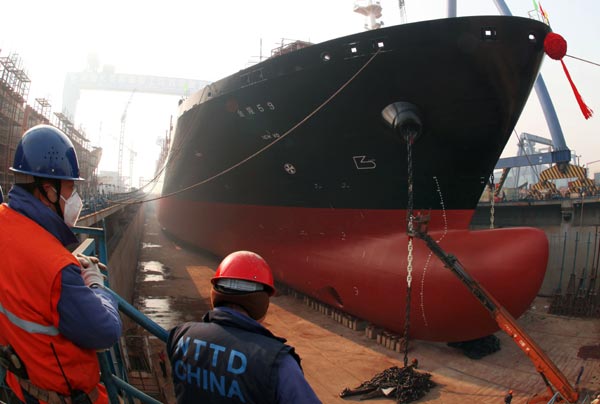|
 A container vessel is built for a German owner at the Jinling Shipyard in Nanjing, Jiangsu province. The country's shipbuilding industry has been plagued by overcapacity, and the government is taking measures to rein in several sectors. Provided to China Daily |
China aims to establish an "early warning system" that would aggregate industrial data from several sources and provide signals of possible overcapacity, officials said on Wednesday.
Chen Bin, director-general of the National Development and Reform Commission's industrial coordination department, told a news conference that an information platform covering industrial capacity will be developed.
The platform will exchange the NDRC's information with data from the Ministry of Land and Resources, the Ministry of Environmental Protection and the China Banking Regulatory Commission, to improve the accuracy of data analysis.
Overcapacity is seen as a major barrier to China's goal of maintaining sustainable growth in 2014.
Chen said he is confident of "partially" solving the problem this year as "many local governments have realized the downside and are working on it with us".
China's GDP grew 7.7 percent last year to 56.88 trillion yuan ($9.4 trillion), the National Bureau of Statistics reported on Monday. That was in line with the central government's target, but there are still problems to be resolved.
"Overcapacity is one of the most important challenges that China is facing in the economic development sector," said Fan Gang, director of the National Economic Research Institute of the China Reform Foundation.
He said that governments of third-tier cities and remote areas should be aware of the risks of excessive infrastructure construction, since so many people in those areas spend most of their time working elsewhere.
Migrant workers "go to big cities such as Beijing, Shanghai and Guangzhou for most of the year, which will result in low profitability for projects in their hometowns", he said. "That could lead to financial risks."
The central government acted to reduce overcapacity last year as it tried to achieve a long-term solution while also accelerating industrial upgrading.
